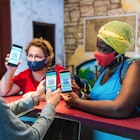
May 16, 2022 • 4 min read

Oct 27, 2021 • 2 min read

Berlin's Christmas markets can introduce the 2G or 3G COVID-19 health pass rules this year ©Getty Images
The festive spirit will be mixed with tighter entry restrictions as Berlin's Christmas markets return after a year's hiatus, requiring people to show proof of their COVID-19 status at the gates.
Germany's world-renowned traditional Christmas markets were postponed last year due to surges in COVID-19 infections, but this year they're back, complete with sparkling light displays, carousels, ice-skating and booths selling everything from gingerbread men to hand-painted trinkets. This year's festivities also come with the requirement for patrons to present their COVID-19 status before they're allowed inside to pursue the stalls or clink steaming mugs of Glühwein.
The Berlin Senate said on Tuesday that Christmas market organisers will be able to apply the so-called 3G or 2G COVID-19 restrictions this year, according to German newspaper Tagesspiegel. Under 3G rules anyone over the age of 12 can present proof of vaccination, recovery or a resent negative COVID-19 test result to enter when markets return on November 22. Under 2G rules, patrons can present either proof of vaccination or recovery only, a negative test will not be enough to get in.
Read more: Europe's best Christmas markets: 10 that are delightfully different

Some popular markets in Berlin who have already confirmed they are applying the 2G rule include Rotes Rathaus, Zitadelle Spandau and Gendarmenmarkt, according to the Visit Berlin tourism board.
Christmas markets are a big deal in Germany. They're a major tourist draw in the winter season, with about 2000 nationwide and roughly 80 markets in Berlin alone. The most famous is arguably the Nuremberg Christmas Market, or the Nürnberger Christkindlesmarkt, in Bavaria, which attracts about two million visitors each year.
Read more: Why Germany is the best place to countdown to Christmas
Some German states are operating under a COVID health pass system that categorizes venues such as hotels, restaurants, cafes, bars, cinemas, theaters, gyms, nightclubs and now markets into 2G or 3G. Venues marked as 3G are open to vaccinated (geimpft) or recovered (genesen) patrons, or tested (getestet) people who can present proof of a recent negative COVID-19 test taken no later than three days prior. Under the 3G system, masks are required indoors and there is a limit to the number of people allowed inside. Venues marked as 2G are open to vaccinated (geimpft) or recovered (genesen) patrons only and don't have capacity limits.
It's up to individual businesses to decide whether they want to be 2G or 3G. Not all states and cities follow the model in the same way. In Hesse, for example, the 3G rule is mandatory and the 2G rule is optional, so be sure to check ahead when planning any trips or activities in Germany.
You might also like:
14 best things to do in Berlin
Berlin's best neighborhoods
Why Berlin is the perfect city break with a teenager


May 16, 2022 • 4 min read

May 10, 2022 • 4 min read



Feb 3, 2022 • 3 min read

Jan 21, 2022 • 4 min read


Dec 24, 2021 • 3 min read

Nov 30, 2021 • 6 min read